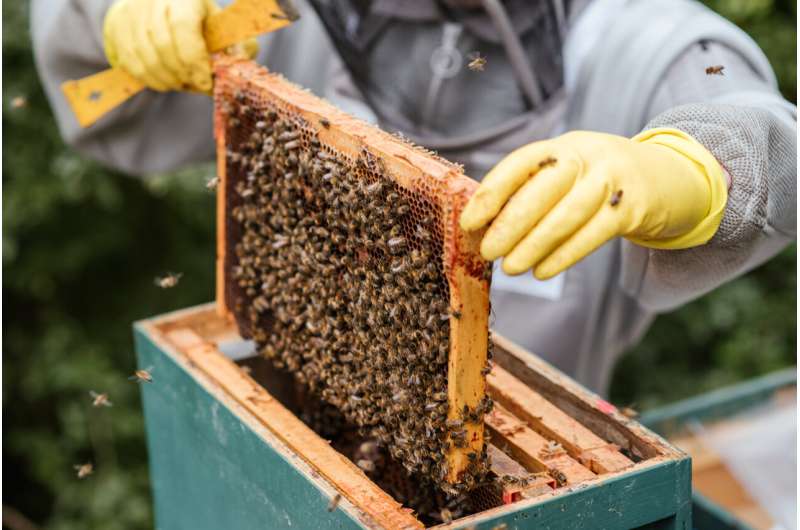Blockchain systems are tracking food safety and origins

When a Chinese consumer buys a package labeled "Australian beef," there's only a the meat inside is, in fact, Australian beef. It could just as easily contain – or a mixture of them all. It's gross and dangerous, but also costly.
Fraud in the global food industry is a that has lingered for years, and even . Food manufacturers around the world are concerned – as many as of them are worried that their products could be easily counterfeited, and say food fraud is hard to detect.
In , I have become convinced that this technology's potential to prevent fraud and strengthen security could fight agricultural fraud and improve food safety. Many companies agree, and are already running various tests, including tracking wine from grape to bottle and even following individual coffee beans through international trade.
Tracing food items
An early trial of a blockchain system to track food from farm to consumer was in 2016, when Walmart collected information about pork being raised in China, where consumers are about sellers' claims of what their food is and where it's from. Employees at a pork farm and livestock health certificates, storing them in a secure online database where the records could not be deleted or modified – only added to.
As the animals moved from farm to slaughter to processing, packaging and then to stores, the drivers of the freight trucks played a key role. At each step, they would , storage temperature and other inspections and safety reports, and official stamps as authorities reviewed them – just as they did normally. In Walmart's test, however, the drivers would photograph those documents and upload them to the blockchain-based database. The running the database, but , to further ensure data integrity.
As the pork was packaged for sale, a sticker was put on each container, displaying a smartphone-readable code that would link to that meat's record on the blockchain. Consumers could and assure themselves that they were buying exactly what they thought they were. in the themselves have made them more and -.
Walmart did similar tests on mangoes imported to the U.S. from Latin America. The company found that it took for consumers to find out an individual fruit's weight, variety, growing location, time it was harvested, date it passed through U.S. customs, when and where it was sliced, the sliced mango was held in and for how long it waited before being delivered to a store.
Preventing counterfeiting
Beyond tracking products' origins, blockchain systems are helping ensure cheap plonk isn't sold in bottles promising expensive wines. Some counterfeiters get their hands on empty wine bottles with top-quality labels, refill them with cheaper wine and .
In December 2016, wine expert Maureen Downey debuted a blockchain system that gives combining more than 90 pieces of data about its production, ownership and storage history – including high-resolution photographs and data from the glass and cork. As the bottle moves from winery to distributors and resellers, the data are updated, and can easily be checked by warehouses, retailers and even auction houses.
More recently, Downey's system has been updated to fight even more sophisticated wine counterfeiters, who have to extract wine without opening the bottle. The upgraded protection embeds a small microchip above the top of a wine's cork, so if someone removes the capsule wrapper or , it will be unreadable.
Ensuring living wages
Consumers are worried not only about contaminated or counterfeit food products. Many consumers say they prefer products that are and contribute to improved . Middlemen siphon off a lot of the money. In the US$200 billion global coffee industry, for instance, stays in producing countries.
Global sales of products approved by Fairtrade, a major certifier of products that respect environmental and human-rights concerns, reached . But Fairtrade and other programs like it have not substantially improved poor people's lives. A study of small farms growing flowers, coffee and tea in Ethiopia and Uganda indicated that areas dominated by Fairtrade producers compared to farms that were larger, commercial and not Fairtrade-certified.
Colorado-based Coda Coffee seeks to ensure fair payments by using a blockchain system to from . The system includes a camera that takes , called a cherry, if they supply bigger and riper cherries and recording the amount paid in a blockchain database for consumers to inspect later.
is updated as it is processed, packed, blended with other beans, roasted and ground, letting consumers know and how much they got paid. Wholesalers and roasters can learn about where it came from and how it was handled, and evaluate the resulting taste, .
These are the – are .
Ensuring data integrity
Blockchain systems are secure, but their data – like other databases – are only as accurate as what is entered. may try to or farm inspections.
In addition, most of the food products in developing economies like and are produced on very small farms that don't have access to technology or internet connectivity. Blockchain systems can also be expensive, which is part of why early trials have involved , wine and coffee.
The research already happening holds the promise of developing cheaper systems that are easier to use and trust – for farmers, food processing plants and customers alike.
Provided by The Conversation
This article is republished from under a Creative Commons license. Read the .![]()



















